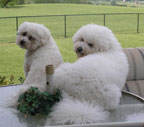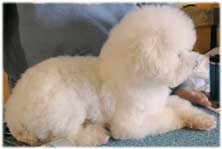|
|
Bichon Frise |
 |
|
THANKSGIVING TIME
CAUTIONARIES |
BICHON
FRISE |
|
|
Attn: Kroger Shoppers |
||
|
'There
is no therapist
in the world as effective
as an adoring
bichon.' |
||
|
SOCIALIZATION OF YOUR PUPPY |
Puppies all tend to be cute . .. but they don't come into our world automatically knowing and trusting humans or the myriad of sometimes 'scary' life situations. Puppies need to be gently taught about visitors, automobiles, vacuum cleaners, bicycles, children and so much more. If they are not quietly exposed to people, other animals, and normal stimuli in their environment, they may grow up to become fearful, anxious, antisocial adult dogs. |
The first few months of a puppy's life are the most critical for development of confidence and trust. The socialization process should begin while the puppy is still with it's mother. Responsible breeders will expose the pups to normal household activities while still being cautiously prudent about not exposing the puppies to germs to which they may be susceptible. Good breeders know that the mother should play an integral part in teaching the puppy and the other siblings proper dog behavior about social skills, manners about biting too hard in play, being polite, sharing toys and going outside to go potty. Sadly, all too frequently, pups are removed far too early ... at around 4-7 weeks of age so they are taken from the all-important developmental ideal of their mom and littermates. It isn't that the pups need the mother's milk so much as it is the pups NEED the sibling play and the mother's training. Pups left with their litter longer tend to grow into much healthier (mentally & physically) adults dogs. Significant damage can be done by taking the pup from it's mom/siblings too young. Ask any person who has done rescue work longer than 20 minutes, and they will tell you stories of the neurosis they see in dogs mentally and emotionally damaged by greedy breeders who want the Cash and to get beyond the hard work of cleaning up after puppies. It's a shame that people who breed their dogs have other motives than the best welfare of the puppies at heart. If they could witness the suffering of the pups down the road, they might feel differently. As soon as you get the new puppy . . . .start with simple, quiet, positive one-person introductions, and gradually include more people in noisier situations. Invite patient, gentle friends, relatives, and their pets to come to the home to meet, greet, and play with the pup. BE CAREFUL NOT TO OVERWHELM AND SCARE YOUR PUPPY!! Children often are too rough with pups - carrying them in a hurtful manner, playing with them in a rough style or falling on them, tripping over them, etc. This treatment can scar a pup for life making them ever-distrusting of children. As soon as your veterinarian says your puppy is adequately vaccinated, take it on as many walks and outings as is possible. Avoid situations that might be high risk for disease such as neighborhood dog parks or areas with multiple stray dogs. To make introductions positive and special, give a small treat to the puppy whenever it meets a new friend. If your puppy seems exceptionally cautious when introduced to situations or stimuli, start off with mild exposure, and give food rewards for non-fearful responses. |
It's very important that your puppy meets a variety of people of all ages and appearances. A puppy that grows up in a restricted social group (e.g. all adults or all females) may show fear and aggression when later exposed to people who appear or act significantly different (e.g. children, men with beards). |
An excellent way to promote early socialization is to take your puppy to training classes. Ask your veterinarian or groomer about positive training classes in your area. Basic classes in obedience, tricks, and elementary agility can all lend themselves to building confidence and trust in your young or old dog. KEY ELEMENT: Positive training and exposure is the real key to developing a trusting dog. Punishment during the early development stages can inversely impact good people skills. Avoid training any method that involves physical discipline, such as swatting the pup, thumping it on the nose, or rubbing its face in a mess. |
If you don't have the capacity & time to invest in proper socialization, please don't buy a puppy or adopt a shy adult dog. Constructive socializing and shaping your puppy's temperament requires an investment in time. Done well, you will find that your efforts are well worthwhile when you become the proud parent of a social, friendly dog. |
|
|
